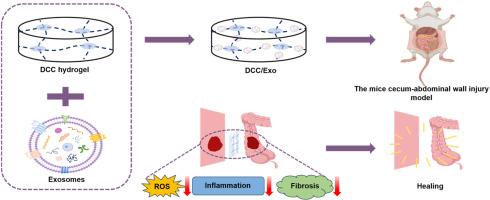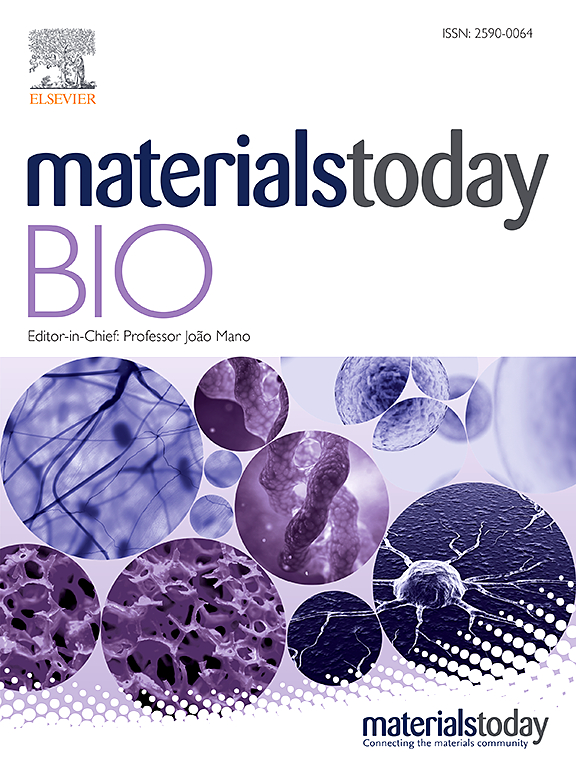Biodegradable exosome-engineered hydrogels for the prevention of peritoneal adhesions via anti-oxidation and anti-inflammation
IF 8.7
1区 医学
Q1 ENGINEERING, BIOMEDICAL
引用次数: 0
Abstract
Peritoneal adhesions (PA) are a common and severe complication after abdominal surgery, impacting millions of patients worldwide. The use of anti-adhesion materials as physical barriers is an effective strategy to prevent postoperative adhesions. However, the local inflammatory microenvironment exerts a significant impact on the efficacy of anti-adhesion therapies. In this study, an injectable hydrogel based on oxidized dextran/carboxymethyl chitosan (DCC) is designed and prepared. Furthermore, the DCC hydrogel is specifically engineered to load the adipose mesenchymal stem cells (ADSCs)-derived exosomes (Exos) for the treatment of PA. The prepared DCC hydrogel can act as the physical barrier via covering the irregular wound surface effectively. Moreover, it shows controlled degradation property, enabling the regulated release of Exos. The DCC hydrogel loaded Exos (DCC/Exo) system has high antioxidant capacity, and can effectively modulate the inflammatory microenvironments and diminish apoptosis. Notably, it promotes a polarization shift towards the M2-like phenotype in macrophages. The RNA-seq analysis confirms that the DCC/Exo system exhibits significant anti-inflammatory properties and promotes a reduction in collagen deposition. Consequently, the DCC/Exo system can inhibit peritoneal adhesions significantly in a mouse cecum-abdominal wall injury model. These results demonstrate the DCC/Exo is an ideal material for preventing postoperative adhesions.

通过抗氧化和抗炎预防腹膜粘连的可生物降解外泌体工程水凝胶
腹膜粘连(PA)是腹部手术后常见的严重并发症,影响着全球数百万患者。使用防粘连材料作为物理屏障是预防术后粘连的有效策略。然而,局部炎症微环境对抗粘连疗法的疗效有很大影响。本研究设计并制备了一种基于氧化葡聚糖/羧甲基壳聚糖(DCC)的可注射水凝胶。此外,该 DCC 水凝胶还专门用于负载脂肪间充质干细胞(ADSCs)衍生的外泌体(Exos),以治疗 PA。制备的 DCC 水凝胶能有效覆盖不规则的伤口表面,起到物理屏障的作用。此外,它还具有可控降解特性,能调节外泌体的释放。DCC 水凝胶负载 Exos(DCC/Exo)系统具有很高的抗氧化能力,能有效调节炎症微环境并减少细胞凋亡。值得注意的是,它能促进巨噬细胞向 M2 样表型极化转变。RNA-seq分析证实,DCC/Exo系统具有显著的抗炎特性,并能促进胶原沉积的减少。因此,在小鼠盲肠-腹壁损伤模型中,DCC/Exo 系统能显著抑制腹膜粘连。这些结果表明,DCC/Exo 是防止术后粘连的理想材料。
本文章由计算机程序翻译,如有差异,请以英文原文为准。
求助全文
约1分钟内获得全文
求助全文
来源期刊

Materials Today Bio
Multiple-
CiteScore
8.30
自引率
4.90%
发文量
303
审稿时长
30 days
期刊介绍:
Materials Today Bio is a multidisciplinary journal that specializes in the intersection between biology and materials science, chemistry, physics, engineering, and medicine. It covers various aspects such as the design and assembly of new structures, their interaction with biological systems, functionalization, bioimaging, therapies, and diagnostics in healthcare. The journal aims to showcase the most significant advancements and discoveries in this field. As part of the Materials Today family, Materials Today Bio provides rigorous peer review, quick decision-making, and high visibility for authors. It is indexed in Scopus, PubMed Central, Emerging Sources, Citation Index (ESCI), and Directory of Open Access Journals (DOAJ).
 求助内容:
求助内容: 应助结果提醒方式:
应助结果提醒方式:


